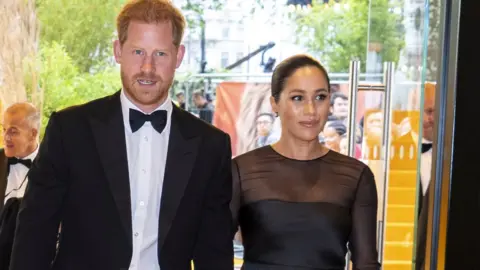Prince Harry warns of 'unconscious bias' and its connection to racism
 Reuters
Reuters"Unconscious bias" can lead to racist behaviour even if people do not consider themselves to be racist, the Duke of Sussex has said.
Writing in Vogue, Prince Harry said unconscious bias was "something which so many people don't understand".
He said prejudice was "learned from the older generation, or from advertising, from your environment".
"Unless we acknowledge we are part of this cycle, then we're always going to be fighting against it," Harry added.
The duke made the comments during an interview with conservationist Dr Jane Goodall, which will be published in the September edition of Vogue - guest edited by the Duchess of Sussex.
The subject of unconscious bias arose during a discussion about children - and whether they can be born angry or learn to hate.
Allow Instagram content?

Dr Goodall said: "[Children] don't notice, 'My skin's white, mine's black,' until somebody tells them."
Harry responded: "It's the same as an unconscious bias - something which so many people don't understand, why they feel the way that they do.
"Despite the fact that if you go up to someone and say, 'What you've just said, or the way that you've behaved, is racist' - they'll turn around and say, 'I'm not a racist.'
"'I'm not saying that you're a racist, I'm just saying that your unconscious bias is proving that, because of the way that you've been brought up, the environment you've been brought up in, suggests that you have this point of view - unconscious point of view - where naturally you will look at someone in a different way.'
"And that is the point at which people start to have to understand."
He added: "You can only be taught to hate."

What is unconscious bias?
Unconscious bias is any detectable bias in our attitudes or behaviour that operates outside of our awareness.
It could be asking a man rather than a woman to pitch a project because, subconsciously, you presume he will be more confident and assertive.
Dr Doyin Atewologun is the director of the Gender Leadership and Inclusion Centre at the Cranfield School of Management. Crucially, she says, the impact is still very real whether it's conscious or not, and "no matter how tiny, or micro or everyday" it might be.

